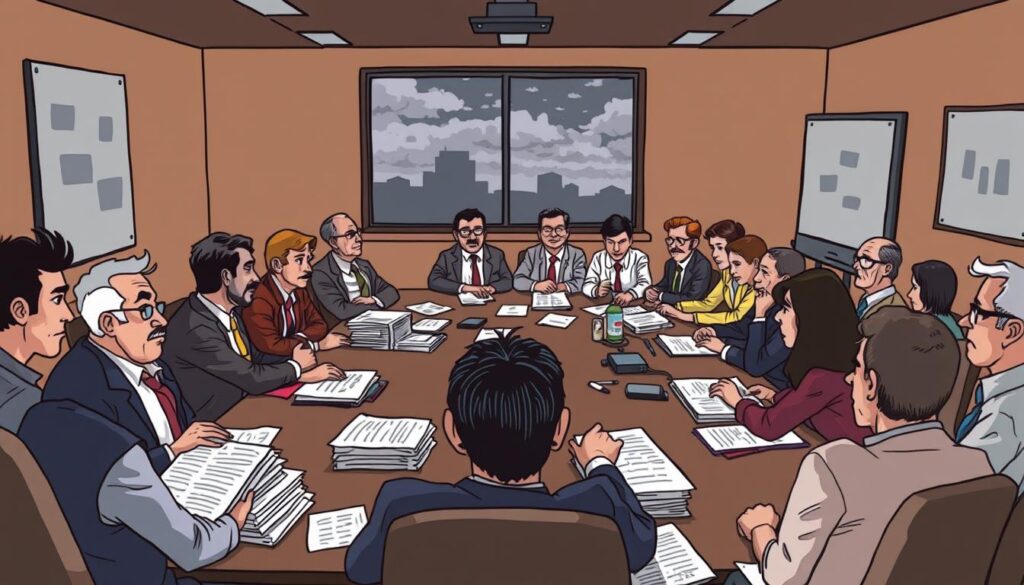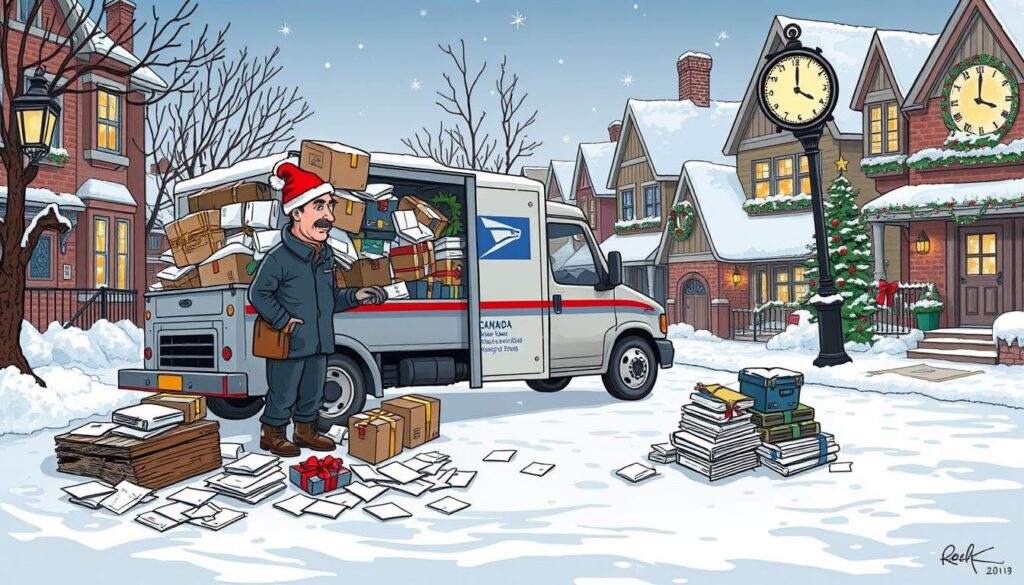The Canadian Union of Postal Workers (CUPW) and Canada Post are in talks. A strike could affect mail and package delivery for millions. With 95% of CUPW’s 60,000 members voting yes, the impact could be big, especially during the holiday season.
The two sides have a 21-day cooling-off period that ends on November 3rd. If no deal is made by then, CUPW can call for a strike with 72-hour notice. Canada Post warns of big disruptions to mail and parcel services if this happens.
Key Takeaways
- The Canadian Union of Postal Workers (CUPW) represents 60,000 employees, and 95% of members have voted to strike if negotiations don’t improve.
- Canada Post and CUPW are in a 21-day cooling-off period that ends on November 3rd, at which point workers can legally strike with 72-hour notice.
- A strike could have significant consequences for millions of Canadians, particularly as the busy holiday season approaches.
- Canada Post has warned of major disruptions to mail and parcel services if a strike occurs.
- The dispute comes as Canada Post faces financial challenges, having lost $490 million in the first six months of 2022.
Current State of Canada Post Labor Negotiations
The Canada Post labor dispute is ongoing. Negotiations between the postal workers’ union and management are in full swing. Both sides have made their demands clear, leading to a possible strike or disruption soon.
Key Demands from Postal Workers
- Fair wages and the right to retire with dignity
- Improved workplace safety and better working conditions
- Preservation of the current pension plan for all employees
Management’s Latest Offer
Canada Post has made a new offer. They propose a nearly 12% wage increase over four years. They also want to protect workers’ pensions, a big concern for the union.
Timeline of Events
- November 2023: CUPW issued a notice to bargain, starting negotiations.
- August 2024: CUPW asked for conciliators to help with talks.
- September 2024: Canada Post made its first global offers to CUPW.
- October 2024: CUPW gave counter-offers to Canada Post.
- October 2024: The conciliation period ended, starting a 21-day cooling-off period.
- October 2024: The federal government appointed mediators to help find an agreement.
- November 2024: The cooling-off period ended, allowing workers to legally strike from November 3.
The labor dispute is still unresolved. The threat of a strike is growing as the cooling-off period ends.
Strike Probability and Legal Position
The Canadian Union of Postal Workers (CUPW) has a strong bargaining position. Ninety-five percent of its members voted for a strike if talks with Canada Post fail. Workers can legally strike on Sunday, but they must give 72 hours’ notice.
Canada Post is still operating as usual while talks continue. The chance of a postal strike is high, as CUPW is ready to take action. But, the law requires a 72-hour notice before a strike can happen.
This notice period gives both sides a chance to find an agreement. It helps avoid a lockout risk or service impacts.
The outcome of the negotiations will decide if a strike happens. It will also affect mail delivery and other service impacts for Canadians. Keeping a close eye on the situation and finding a solution is key.
| Key Factors | Details |
|---|---|
| Strike Vote | 95% of CUPW members voted in favor of a strike |
| Legal Notice Period | 72-hour notice required before workers can strike |
| Current Operations | Canada Post continues normal operations during negotiations |
| Potential Impacts | Possible lockout risk and service impacts if a strike occurs |
The situation is still changing, and both sides are trying to find a solution. They aim to address postal workers’ concerns and keep mail and packages flowing. Keeping up with the negotiations is important.
Financial Impact on Canada Post Operations
The postal disruption has hit Canada Post hard financially. The company has seen big losses in recent years. The current labor dispute has made things even worse.
Recent Financial Losses
Canada Post lost $490 million in the first six months of 2024. Since 2018, they’ve lost over $3 billion. This shows how serious their financial problems are.
Competition from Private Carriers
Canada Post faces tough competition from UPS, FedEx, and Purolator. These private companies can serve customers if Canada Post goes on strike. This could hurt Canada Post’s market share and income.
Impact on Future Sustainability
Experts like Carleton University’s Ian Lee say Canada Post is in trouble. The company’s future is uncertain. This raises big questions about Canada’s postal services.
| Metric | Value |
|---|---|
| Losses from Operations (First Half 2024) | $490 million |
| Losses Since 2018 | Over $3 billion |
| Proposed Wage Increase | 11.5% over 4 years |
| Potential Disruptive Impact | Approximately 625,000 eligible U.S. voters in Canada |
“Canada Post has crossed into territory where it is no longer sustainable,” said Ian Lee, a business professor at Carleton University.
Canada Post Strike Update: Latest Developments
The labor dispute between Canada Post and the Canadian Union of Postal Workers (CUPW) is ongoing. Canada Post made new offers to CUPW on Tuesday. These include higher wages and better pension protection.
CUPW is now reviewing these offers. Labor Minister Steve MacKinnon met with both sides on Thursday to help reach an agreement. Both Canada Post and CUPW want to avoid a strike.
The Canada Post Strike Update shows the union’s strong support for strike action. Over 95% of workers are ready to go on strike. This labor dispute has lasted over a year, making things complicated.
“Our goal is to work towards solutions that support the long-term success of Canada Post while addressing the struggles of our members,” said Jan Simpson, CUPW national president.
The latest news highlights the tough negotiations ahead. Both sides aim to find a solution that works for everyone. This is crucial to avoid service disruptions.
Union’s Primary Concerns and Demands
The Canada Post strike negotiations are ongoing. The Canadian Union of Postal Workers (CUPW) is fighting for fair wages, safe work, and the right to retire with dignity. They represent over 55,000 members.
Pension Plan Issues
Pensions are a big issue in the talks. Canada Post wants new employees to join a different pension plan. This plan shifts most of the risk to the worker, which the union strongly opposes.
The union believes these changes threaten the retirement security of its members. They want to protect their pension plans.
Workplace Safety Concerns
Workplace safety is another major concern for the union. CUPW has raised issues about the quality of equipment and working conditions. They say these factors have hurt employee well-being and productivity.
They claim these problems have cost Canada Post a lot in the past year. The union wants better safety for postal workers.
Wage Increase Proposals
The union also wants fair wage increases. Canada Post offered an 11.97% wage bump over four years. But the union finds this offer too low, given the union negotiations and service impacts.
The union is ready to issue a strike notice if talks fail. The public is watching closely, waiting for the outcome of these critical union negotiations and the service impacts on Canada’s postal system.
Government’s Stance on the Dispute
The labor dispute between Canada Post and its workers is ongoing. The federal government is urging both sides to find an agreement. Labour Minister Steve MacKinnon has met with Canada Post and the Canadian Union of Postal Workers (CUPW) to help resolve the issue.
The government hasn’t said if it will step in if there’s a strike. This uncertainty worries people, especially as the holiday season is near. The New Democratic Party has stated they won’t support any law forcing workers back to work if there’s a strike.
With a legal strike date set for November 3, everyone is watching what the government will do next. Postal workers have voted to go on strike, showing they’re ready to take action. The outcome of these talks will affect the labor dispute and have big service impacts across Canada.
“The federal government has urged both parties to reach a collective agreement and is working to facilitate that outcome.”
It’s unclear if the government will get involved or let the parties find a solution themselves. The situation is tense, with big consequences for Canada Post and the public it serves.
Impact on Holiday Season Deliveries
The Canada Post strike threat is a big worry for businesses and shoppers as the holidays near. The holiday season brings a big increase in packages, and a strike could really hurt. Small business owners, like Frederick Boivin in Ottawa, are worried about their online sales, especially to the U.S. and Europe.
Contingency Plans
Canada Post warns that a strike could make other delivery options more expensive or hard to find. Businesses should think about backup plans, like using different carriers or changing when they ship. Online stores like eBay are telling sellers to look for other ways to send packages to avoid delays.
Alternative Delivery Options
- Private courier services (e.g., FedEx, UPS, DHL)
- Local delivery services
- Parcel pick-up locations
- In-store pickup
These options might help, but they could also cost more or have their own limits. This could make things harder for businesses and shoppers during the busy holiday season.
The threat of a strike is especially bad for businesses that count on the holidays to make more money. Frederick Boivin notes that November and December are key times for out-of-town sales. With possible strikes at ports in Montreal and British Columbia, the retail sector could face big problems.
| Metric | Value |
|---|---|
| Canada Post’s Reported Losses | $490 million in the first half of 2024, $3 billion since 2018 |
| Canada Post’s Latest Wage Offer | 11.5% increase over four years |
| Postal Worker Strike Mandate | 95.8% of urban workers and 95.5% of rural workers represented by CUPW voted in favor of supporting a strike |
Canada Post and the Canadian Union of Postal Workers (CUPW) need to work fast to solve their issues. This is to avoid big problems for businesses and people who need the postal service during the holidays.
Rural Communities and Service Disruption
Rural communities in Canada, especially in Newfoundland and Labrador, might face big problems if there’s a postal strike. Many big courier services don’t deliver in these areas. So, Canada Post is key for sending mail and packages. A strike could really hurt these communities, especially during the holiday season.
Canada Post is crucial for rural areas with few delivery options. These places need the postal service for goods, staying in touch, and joining the economy. A long strike could make them feel left out and cut off from others.
As talks between Canada Post and the Canadian Union of Postal Workers go on, it’s important to think about rural folks. Keeping the postal service reliable and easy to reach in these places is a must. The postal disruption and service impacts could really harm these communities.
“A strike at this time could severely affect Canada Post’s peak delivery season, including Black Friday and Christmas sales.”
The holiday season is coming, and rural areas need Canada Post more than ever. Any delay could mess up the delivery of gifts, essentials, and more. This could cause a lot of trouble and inconvenience. Keeping postal services running in these areas is very important during the talks.
The postal disruption and service impacts in rural Canada show how important a good postal system is. As talks go on, it’s key to listen to the needs of these communities. Keeping the postal service strong in remote areas is a big priority for everyone involved.
Back-to-Work Legislation Possibilities
The labor dispute between Canada Post and its workers is getting worse. Now, back-to-work legislation is seen as a possible fix. The New Democratic Party says it won’t support this if a strike happens. They believe the best deals are made at the bargaining table.
This could be a problem for the Liberal minority government. They might struggle to pass back-to-work legislation without opposition party support.
Political Party Positions
The NDP’s labor critic, Matthew Green, strongly opposes back-to-work legislation. He says it hurts collective bargaining and workers’ rights. The party thinks the government should not get involved in labor disputes.
Historical Precedents
But, the government has shown it might intervene in this dispute. In August, they used back-to-work legislation to end a railway shutdown. This shows they’re ready to act if essential services are at risk.
This history might guide the government’s actions in the Canada Post dispute. If mail and parcel delivery problems get bad enough, they might step in.






